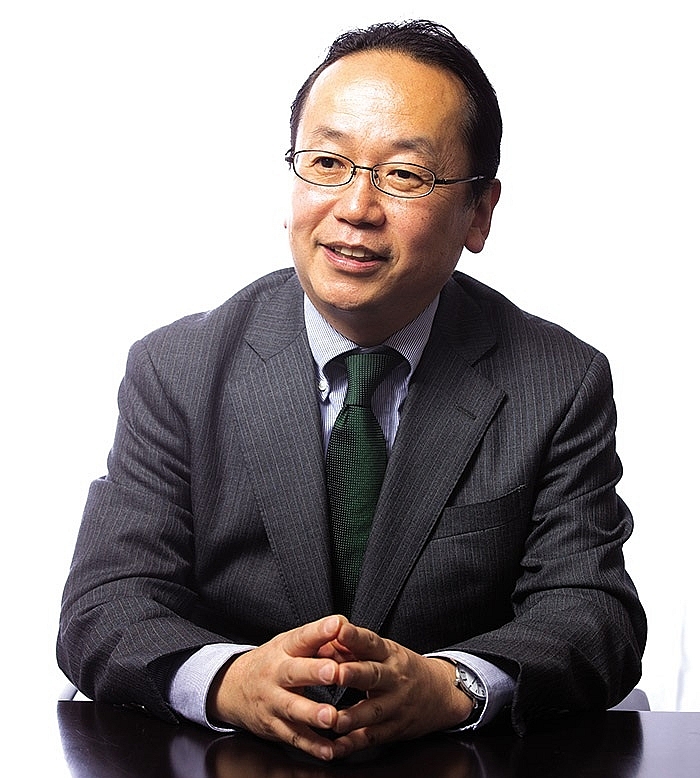Encouraging an investor-friendly framework for the capital market
 |
WHAT POTENTIAL IN VIETNAM’S CAPITAL-FINANCIAL DEVELOPMENT ARE YOU SEEING IN THE COUNTRY AT THE MOMENT?
The Vietnamese capital and finance market has recently shown remarkable improvement as can be seen by the stock market capitalisation ratio of more than 80 per cent of GDP. On the other hand, it has much more to grow in terms of both volume and quality, and there still remains several challenges to be tackled going forward. Funding by private enterprises is still dominated by bank-lending with relatively short-term maturity in Vietnam. The apparently high capitalisation ratio has been significantly driven by the progress of state-owned enterprise equitisation, and does not necessarily represent that huge demand for private sector capital raising is satisfied.
WHAT CHALLENGES ARE YOU ENVISIONING FOR THE COUNTRY IN THIS MARKET?
The number of strategic and institutional investors who pursue long-term turnover seems to be limited, and many appear to surf the market for short-term profit. This sometimes constrains private enterprises from actively creating investment for growing business and may have impeded their potential competitiveness.
Besides, the corporate bond market is still at an initial development stage. This situation highlights the importance of promoting an investor-friendly business environment equipped with “fairness, transparency and efficiency.”
JAPAN IS WELL-KNOWN FOR ITS EFFECTIVE CAPITAL-FINANCIAL DEVELOPMENT. WHAT USEFUL EXPERIENCE CAN VIETNAM LEARN FROM JAPAN IN THIS REGARD?
Looking at the experience of Japanese equity development with capitalisation of 124 per cent of GDP, the second-largest in the world, they have made sustained efforts to develop a fair, transparent and efficient equity market that supports private enterprises’ long-term capital demand.
Such efforts include the enhancement of good corporate governance and disclosure; the modernisation of financial reporting standards; and the diversification of instruments such as classed-shares, exchange traded funds, and derivatives. Their efforts also include the introduction of a well-designed market-board structure to meet the needs of financiers; the strengthening of market surveillance; and the development of a safety net for investors.
In addition, in order to improve the efficiency of market transactions, Japan successfully completed a merger of the Tokyo Stock Exchange and Osaka Stock Exchange in 2011. That was one of the biggest events in Japanese market history. While institutional backgrounds are different among the countries, it is universally important for any country, including Vietnam, to promote an investor-friendly business environment in order to attract more funding and expand the opportunity for private enterprises to pursue their investment needs.
The Vietnamese government is also fully aware of this issue, and the urgency to upgrade the environment of the equity market for further socio-economic development, through the capacity building of the relevant authorities. Thus, it requested the government of Japan for support in its efforts in this field through the implementation of the technical co-operation project to the State Securities Commission (SSC) under the Ministry of Finance.
COULD YOU ELABORATE MORE ON THIS PROJECT?
Last month, the Japan International Cooperation Agency (JICA) and the SSC signed the Record of Discussion of the “Project for Capacity Building on Improving Fairness and Transparency of Vietnamese Equity Market” to launch the initial activities. The project aims at improving the capacity of the SSC, Ho Chi Minh Stock Exchange, and Hanoi Stock Exchange to conduct market surveillance, supervise intermediaries, manage listings and public offerings, and raise awareness of investor protection among enterprise leaders.
Within the project, the JICA will provide support to the SSC and two stock exchanges through various activities such as reviews on current frameworks, staff training, and consultancy to update internal operation manuals and revision of legal frameworks when necessary. The project is expected to start from early 2019 and continue for three years.
The project was prepared in the context of the implementation of “Strategy for development of Vietnamese securities market for the period of 2011-2020”, approved by the prime minister in 2012, which outlines a clear vision to enable the Vietnamese security market to integrate into ASEAN and international markets. The project is also aligned with the direction of the upcoming amendment of the Law on Securities. Through the project, the JICA expects that the Vietnamese equity market will improve fairness and transparency and thus attract more investors. For more than two decades, the JICA has been supporting Vietnam’s government to develop its economy and promote international economic integration through various technical and financial co-operation projects.
Thanks to sustained growth, Vietnam has already become a middle-income country, and what is required for the country has been gradually changing. In this context, the JICA views that the project is specifically tailored to meet the very timely needs of the country’s capital market, based on the rigorous analysis of its immediate challenges, taking full account of the latest development stage of this country.
What the stars mean:
★ Poor ★ ★ Promising ★★★ Good ★★★★ Very good ★★★★★ Exceptional
 Tag:
Tag:
Related Contents
Latest News
More News
- Cashless payments hit 28 times GDP in 2025 (February 04, 2026 | 18:09)
- SSIAM and DBJ launch Japan Vietnam Capital Fund (February 04, 2026 | 15:57)
- Banks target stronger profits, credit growth in 2026 (February 04, 2026 | 15:43)
- Vietnam on path to investment-grade rating (February 03, 2026 | 13:07)
- Consumer finance sector posts sharp profit growth (February 03, 2026 | 13:05)
- Insurance market building the next chapter of protection (February 02, 2026 | 11:16)
- NAB Innovation Centre underscores Vietnam’s appeal for tech investment (January 30, 2026 | 11:16)
- Vietnam strengthens public debt management with World Bank and IMF (January 30, 2026 | 11:00)
- Corporate bond market poised for stronger growth cycle (January 28, 2026 | 17:13)
- Vietnam's IPO market on recovery trajectory (January 28, 2026 | 17:04)






















 Mobile Version
Mobile Version